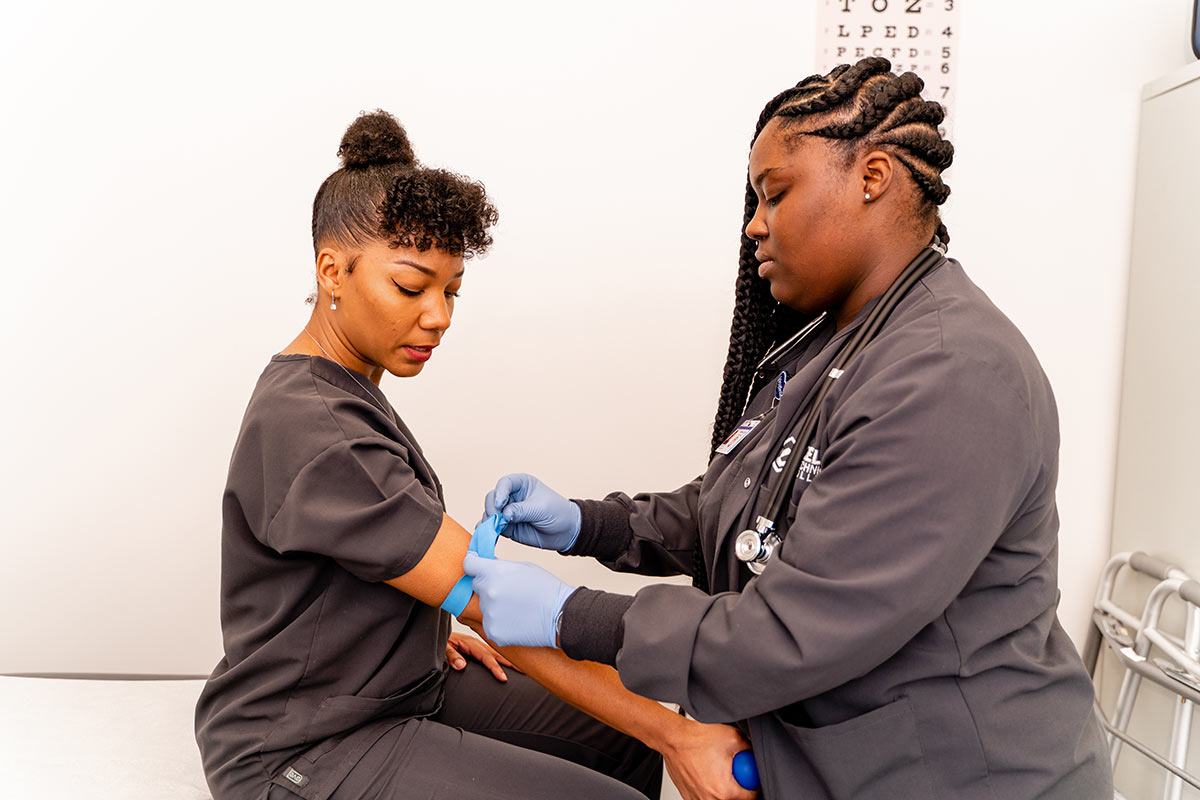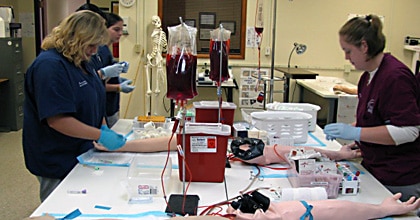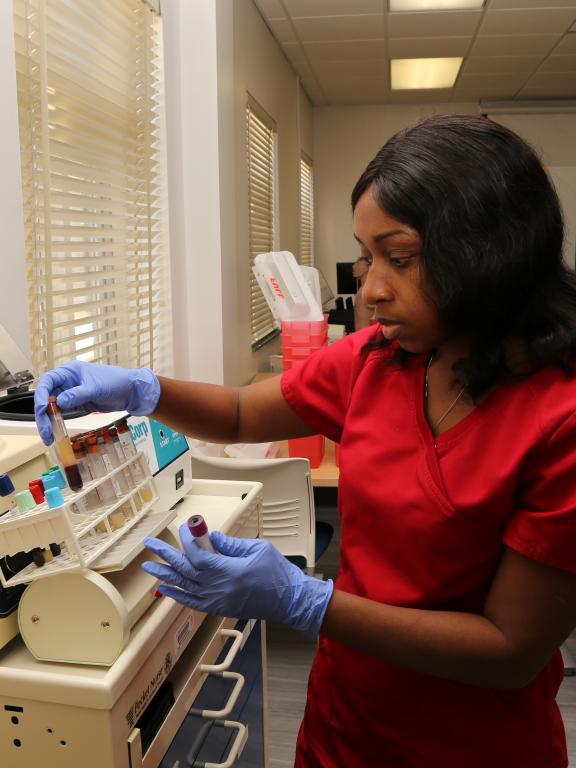Phlebotomy Classes Near Me: Your Complete Guide to Enrollment
Wiki Article
The Course to Accreditation: Recognizing the Phlebotomy Educating Program Journey and Its Importance
As you take into consideration the course to qualification in phlebotomy, it's important to comprehend the role you'll play in health care. Your training will certainly cover important abilities, from blood collection techniques to patient communication.
The Duty of Phlebotomists in Health Care
Phlebotomists play a necessary function in the medical care system, working as the essential web link in between patients and important analysis screening. You'll execute blood attracts, making certain examples are gathered properly and safely. Your know-how aids in diagnosing medical conditions, checking wellness, and directing therapy choices.In your daily interactions, you'll require to establish trust fund with people, making them feel comfortable during what may be a difficult experience. You are in charge of classifying and handling examples carefully to stop contamination or mistakes, which might influence examination outcomes.
Yet, you'll frequently function together with doctors and nurses, interacting essential info about individuals' conditions. Your role is basic in preserving the operations in medical care settings, ensuring prompt and exact results. By mastering your skills, you contribute meaningfully to person care, making you an essential component of the medical group. Accepting this obligation is vital to your success as a phlebotomist.
Overview of Phlebotomy Training Programs
When discovering phlebotomy training programs, you'll locate numerous types created to fit different timetables and discovering styles. Each program assists you establish vital abilities like blood collection and person communication. Recognizing these alternatives is crucial to picking the ideal path for your occupation.Sorts Of Training Programs
A number of types of training programs are readily available for those aiming to end up being efficient in phlebotomy. You can select from certification programs, which commonly last a couple of months and concentrate on essential abilities. There are additionally diploma programs that provide a more thorough education, usually lasting as much as a year. If you're trying to find a deeper understanding, an associate level in a relevant area might be the ideal fit. On the internet courses use versatility for those stabilizing work or family dedications, enabling you to examine at your very own pace. Additionally, some medical facilities and centers offer on-the-job training programs, offering sensible experience while you find out. Whatever path you select, each program aims to furnish you with the essential skills for an effective phlebotomy career.
Trick Skills Established
Understanding phlebotomy calls for a collection of key skills that are created through extensive training programs. You'll learn technological abilities like correct capillary selection, needle insertion, and blood collection techniques. These hands-on methods assure you can carry out procedures safely and successfully. In addition, interaction skills are basic; you'll need to connect with individuals, discuss procedures, and put them comfortable. Recognizing makeup and physiology is essential, as well, as it assists you find veins and recognize the body's feedback to blood draws. You'll acquire understanding of safety procedures and infection control, assuring you keep a sterile setting. Each of these abilities is essential for your success as a licensed phlebotomist, making you a valuable possession in any kind of healthcare setup.Key Elements of a Phlebotomy Course
In a phlebotomy program, you'll focus on essential topics that lay the groundwork for your future occupation. You'll engage in hands-on training that enables you to use what you've learned in real-world setups. Both the curriculum and useful experience are important for your success as a phlebotomist.Core Curriculum Introduction
While seeking a phlebotomy training course, you'll come across a core curriculum designed to equip you with fundamental skills and expertise. Phlebotomy Training Course. This educational program usually consists of composition and physiology, concentrating on the blood circulation system and comprehending blood components. You'll additionally discover about different sorts of blood collection approaches, including venipuncture and capillary leak strategiesIn addition, infection control and security methods are important parts, guaranteeing you understand exactly how to maintain a clean and sterile atmosphere. You'll research patient communication, highlighting interaction and empathy, which are essential for alleviating patient anxiousness.
Hands-On Training Experience
Getting hands-on experience is a vital part of your phlebotomy training course. This practical training enables you to use what you have actually learned in a real-world setup, boosting your skills and confidence. You'll practice venipuncture strategies, learn exactly how to manage various sorts of samplings, and get aware of the tools utilized in the field. Under the advice of knowledgeable teachers, you'll improve your abilities, guaranteeing you're prepared for any type of situation you could encounter.Furthermore, you'll get the chance to engage with patients, which is essential for establishing your interaction skills. This mix of technical Phlebotomy Classes Near Me effectiveness and interpersonal abilities is essential for your success as a qualified phlebotomist. Ultimately, hands-on training is where concept fulfills practice, strengthening your expertise and preparedness for accreditation.
Certification and Licensing Demands
Prior to you can begin your job in phlebotomy, it is vital to understand the qualification and licensing needs that differ by state. A lot of states require phlebotomists to hold a qualification from an acknowledged organization, such as the National Phlebotomy Organization or the American Culture for Professional Pathology. These accreditations normally involve passing a test that tests your understanding and skills in the field.In enhancement to qualification, some states have specific licensing demands. You might need to finish a specific variety of hours in medical practice, send evidence of training, or undertake a background check. It is necessary to research your state's regulations to ensure you fulfill all needed standards.
Staying educated about these demands not just aids you safeguard a position however likewise enhances your trustworthiness as a professional. By meeting these requirements, you'll be well on your means to an effective profession in phlebotomy.
Hands-On Training and Practical Experience
Hands-on training and functional experience are essential parts of your phlebotomy education, as they permit you to apply academic expertise in real-world situations. During your training, you'll take part in monitored venipuncture, find out proper techniques, and come to be acquainted with numerous blood collection devices. This direct participation is crucial for developing your self-confidence and developing your abilities.You'll work very closely with experienced experts who can assist you via the subtleties of client interaction and example handling. Each session not just strengthens your understanding but additionally prepares you for the busy environment of health care setups.
Additionally, lots of programs incorporate clinical turnings, enabling you to experience diverse setups, from hospitals to outpatient clinics. This direct exposure aids you adapt to different challenges and person demands, ensuring you're well-prepared for your future function. Welcome these possibilities, as they're important to ending up being a proficient and compassionate phlebotomist.
Obstacles Faced During Training
While acquiring hands-on experience is necessary, it's crucial to acknowledge the obstacles that can develop during your phlebotomy training. Additionally, grasping the skills needed for blood draws takes practice; you might battle with method originally.Time administration can likewise be a difficulty, as balancing theory, practical sessions, and personal dedications can feel challenging. You may deal with varying discovering speeds among your peers, bring about sensations of self-doubt if you assume you're falling back. Ultimately, adapting to the different individualities of teachers can be tough, as each might have a special training style.
Identifying these challenges early on can prepare you for success and assist you create durability throughout your training journey.
Occupation Opportunities After Qualification

As you get experience, you might even think about concentrating on locations like pediatric or geriatric phlebotomy, providing to certain patient demands. Some phlebotomists pick to advance their careers by coming to be research laboratory service technicians or pursuing further education in healthcare areas.
Additionally, your accreditation can result in duties in training or monitoring brand-new phlebotomists, allowing you to share your knowledge. With the healthcare industry continually expanding, your skills will certainly always be in demand, paving the method for a secure and satisfying profession. Accept the chances waiting on you!
Regularly Asked Questions
What Is the Typical Duration of a Phlebotomy Educating Course?
Phlebotomy training programs generally last around four to 8 weeks. You'll take part in hands-on technique, class guideline, and on-line understanding. Finishing this training prepares you for certification and a rewarding occupation in health care.Are Online Phlebotomy Courses Available?
Yes, on the internet phlebotomy training courses are offered. They use adaptability and convenience, allowing you to study at your very own rate. Just validate the program is approved to fulfill certification requirements and gain valuable abilities for your profession.Just How Much Does Phlebotomy Training Generally Expense?
Phlebotomy training normally sets you back between $700 and $2,500, depending upon the program and place. You need to take into consideration elements like program size, included products, and hands-on experience when selecting the appropriate training for you.What Are Typical Requirements for Phlebotomy Training?
Typical prerequisites for phlebotomy training usually consist of a senior high school diploma or GED, booster shots, and a background check. Some programs may additionally require fundamental healthcare expertise or qualifications, ensuring you're gotten ready for hands-on training.Can I Work While Completing My Phlebotomy Training?
Yes, you can work while finishing your phlebotomy training. Several students equilibrium work with their research studies, however ensure to manage your time properly to guarantee you meet both work and training commitments successfully.Report this wiki page